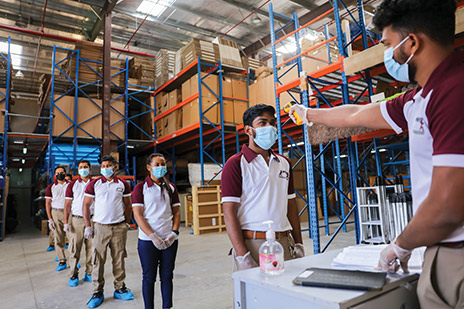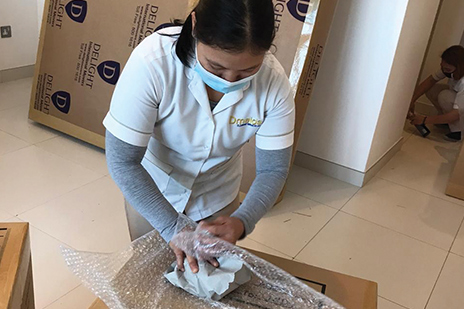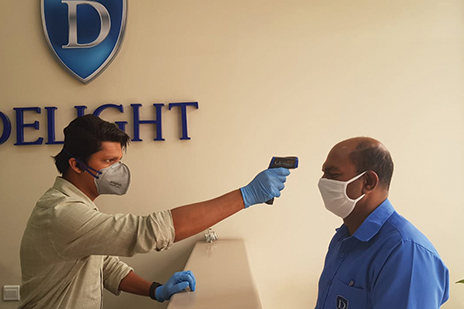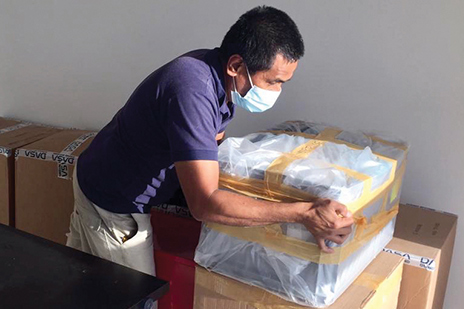The shining skyscrapers of Dubai have witnessed an upheaval in recent months, as many expat workers left this successful hub because of the COVID-19 crisis. While this exodus created a boom time for many international movers in 2020, what does the future hold for this key Gulf city – and the UAE overall?
The shockwaves from the coronavirus pandemic have reached far and wide across the globe, with repercussions stretching far beyond the immediate impact on people’s health.
In Dubai – with its booming economy and status as the most populous city in the United Arab Emirates (UAE) – many assumptions flew out the window when the crisis hit.
The UAE, which celebrates its 50th anniversary this December, has long been on an upward trajectory –but the COVID-19 crisis hit this popular expat mecca hard.
Many expats lost their employment and returned to their home countries in various corners of the world. This created a short-term ‘gold rush’ for international movers, including FIDI Affiliates, who were kept busy handling the demand for outbound services.
While some Affiliates are now reporting a renewed level of interest in expats moving back into the UAE, the global business environment is more unpredictable than ever in 2021, with few certainties.
COVID changed everything
According to Curt Clements, CEO of Move One Relocation in Dubai: ‘The pandemic changed everything. For many, it destroyed their business model while, for others, it provided an accelerated view of the future.’
Move One’s operations cover three divisions spanning removals, logistics and relocations – including DSP (destination service provider) and immigration.
‘While our moving and relocation business experienced a pause for a few months last year, our critical logistics division pushed into high gear,’ says Clements.
Rahul Pillai, CEO, Interem – International Removals Division of Freight Systems Co. Ltd, which also has FIDI-accredited moving operations in Dubai, recalls that the pandemic led to a short-term dip in demand. Customers were unsure about whether moving services would be available.
This was followed by ‘a spurt in the outbound business, mainly because of job redundancies’. For those able to adapt, however, the global health crisis meant opportunities could be seized.
Pillai explains: ‘COVID-19 has resulted in an increase in revenue. The pandemic brought a whole new set of challenges, which, in turn, resulted in going about business with a new perspective, while also looking out for alternative sources of revenue. A change in business tactics – and swift implementation of these – helped to sustain our business.’

Strict lockdowns
At Gulf Agency Company (GAC) Dubai LLC – one of the biggest moving operators in the region – executives experienced a number of phases during the pandemic and the economic fallout arising from it.
Shawn Wood, Regional Manager at GAC, recalls: ‘First, we had two months of lockdown, which negatively impacted business, then a period of increased activity – the majority of which were cash-on-delivery exports. But, averaged out, there wasn’t too much of a net gain in my opinion. We still finished the year below our target budget.’
He adds: ‘There was a surge of people leaving (the UAE) during June, July and August – much more so than in previous moving seasons because of massive redundancies made by UAE employers. However, April and May were under strict lockdown conditions. The airports were basically closed; business was down considerably during this time.’
In 2020, GAC saw a few months of minimal imports. But, according to Wood: ‘By August, it started to increase to decent levels and our imports are similar to what they were pre-pandemic. In general, imports for the UAE have been down in recent years.’
At DASA International Movers – a company with a 40-plus-year history in the UAE – Managing Director Simone Percy and her staff experienced a year that was by turns busy, challenging, and rather odd.
‘We have been very busy, fortunately. However, it is a very strange market, mostly made up of cash moves with comparatively few corporate moves – this was especially noticeable during the normal summer peak season,’ she said.
‘It has not been an easy year – ensuring that all staff were safe and well was the No 1 priority. The traditional ‘season’ has been all over the place and long-term planning out of the window. I wish I had a crystal ball to see what tomorrow will bring – we are agile enough to adapt.’
Business picked up quickly
Delight International Movers, which has a FIDI-affiliated operation in Abu Dhabi, has a positive take on some of the experiences of 2020.
‘Even though there was a late start to the season, things picked up fairly quickly. We were extremely busy servicing existing contracts and some new projects,’ says Shankar Ram, Regional Head of Relocation at Delight International. ‘This included inbound, outbound and domestic moves, too.’
Ram points out that, aside from the problems of 2020, the UAE has weathered very tough times before.
‘This is not the first time we have come across such a challenge, as during the peak of the global recession in 2008-09, people expected the UAE to diminish from the world stage,’ he says.
‘Similarly, we understand 2020 was a challenging year, but, on the other hand, there are lots of opportunities that have opened up as a result of changes in investment policies. Reforms have been made to attract, create and nurture an investment-friendly economy.’

E-Movers LLC is another FIDI Affiliate with operations based in Dubai, and General Manager Roy Augustin has a positive outlook on prospects, despite the challenges of 2020.

He recalls: ‘Volume for inbound shipment was reduced to very minimal levels until late June, which was directly connected with travel restrictions for incoming people and a pause in issuing residency visas. The volume bounced back from July and the trend continues.’
Augustin adds: ‘With the majority of the UAE being expats, it’s a floating population, and we are quite sure that business will become normal sooner rather than later. As soon as global travel restrictions are lifted, things will be back to normal.’
Don’t write off the UAE
While there is no doubt that the global health crisis came as a hammer blow to Dubai and other locations around the world, it would be foolish to write off the UAE as a result.
This business hub has a habit of confounding expectations. Although the wealth of this Emirate was founded on oil, the UAE is not a totally petroleum-based economy. As DASA’s Simone Percy points out: ‘We have world-class hotels and facilities here for tourists and business visitors. Sadly, when everything was locked down and the world stayed at home, these were the sectors hit the hardest.
‘But, 2021 marks 50 years of the UAE and we have the World Expo starting in October – never write off the UAE; we are more resilient than that.’
Percy, whose father founded the forerunner to DASA in Abu Dhabi, remembers witnessing the fourth National Day as a child. She watched the parade with the leaders of the seven Emirates sitting on a dais close by, when the local population was less than half a million people. Now, Dubai counts around 3.4 million citizens.
Percy says: ‘Last year, the UAE was a signatory to the Abraham Accords. A few weeks later, I was on a Zoom call to a company in Israel – and this in the midst of a global crisis. The UAE will come back better than ever.’
DASA isn’t alone in seeing light at the end of the tunnel and a positive outlook for this ambitious Gulf state. Move One’s Curt Clements says: ‘We anticipate a busy year on the moving and household goods moving side in 2021, as the vaccines allow the world to restart global travel, and global economies begin their recovery.
‘Being headquartered in Dubai has been a very big positive for us, as the Emirates have been extremely forward-thinking in using their airlines, massive ports and airport facilities to help support this current and future challenge,’ he added.
GAC also has a FIDI-affiliated office in Abu Dhabi, and Regional Head Shawn Wood is optimistic for the future. ‘I think the moving market here will continue to do well. However, I do think that, overall, volumes have contracted and the number of competitors in the local marketplace has not,’ he says. ‘Over time, I’m confident that market forces will correct this imbalance.’

At Delight International Movers, Shankar Ram is also upbeat, citing recent big investments and joint ventures targeting Abu Dhabi. Globally, he notes a trend for organisations to move their Asian headquarters into the UAE, mostly Abu Dhabi. The political unrest in Hong Kong has helped fuel this move.
‘The UAE has offered facilities such as Abu Dhabi Global markets (ADGM) and Dubai International Financial Centre (DIFC), with a framework and legal infrastructure, which has attracted many companies from Southeast Asia as well,’ says Ram.
‘We are confident that, once things normalise, the UAE will be a very prominent business destination.’


